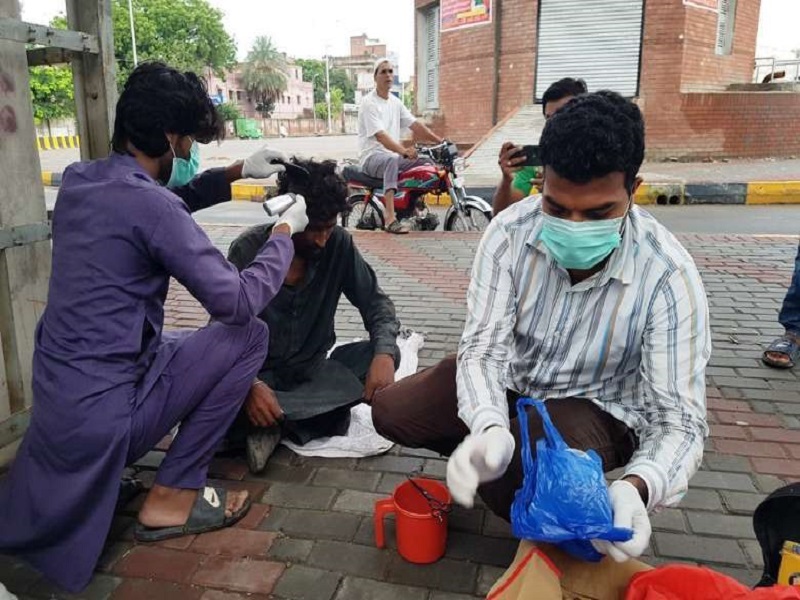As Muslims in Pakistan celebrated the Eid al-Adha festival, Naveed Masih set out in his rickshaw looking for homeless people sheltered under a bridge of the Lahore Metro bus service.
"The Bible says help each other," reads a banner depicting a Bible emblazoned on the rear of the Christian's rickshaw.
At the Anarkali station, he found Abdul Aziz, a rag picker, sleeping on the footpath with a worn-out plastic sack serving as a blanket.
"It's a service for Allah," Masih told Aziz as he helped him take a quick bath on the roadside, pouring water from a jerry can.
This went on for some 30 minutes before Aziz was handed a packet of Pakistan's popular biryani.
Aziz thanked Masih and his friends for the new clothes and clean look for Eid.
"This is the first time in years I was treated like a human. My brothers took over my property. I can do any kind of manual labor," he told UCA News.
Masih and his three friends have been taking care of the homeless including drug addicts and the mentally challenged found living on the streets of Lahore since 2019.
He has helped more than 40 people, most of them elderly, so far and has been featured on news and web channels.
But ever since the deadly Covid-19 pandemic struck the world, his "footpath mission" in Lahore has become riskier.
Pakistan is in the middle of a fourth coronavirus wave and Masih and his friends are careful not to venture out without wearing face masks and gloves. "God has saved our team from coronavirus," he said.
Ironically, it was a personal tragedy that set this Pakistani Christian on his humanitarian mission.
In 2014, Masih was refused an ambulance to carry the body of his deceased father from a government hospital.
"I requested the medical superintendent of Lahore Services Hospital several times. The ambulance was standing right in front of my eyes. I was told that it is reserved for protocol. Not for people like me," he recalled.
He later hired the Edhi Foundation's ambulance service, available across Pakistan and known for being more efficient than state-run services.
Abdul Sattar Edhi, the Muslim man behind this initiative, was honored by bishops as the "Pakistani Good Samaritan" in church services across the country after his death in 2016.
Masih said he decided to follow in the footsteps of the famous philanthropist. "Humanity is the greatest religion. People should be honored while they are still alive," he said.
In 2017, he bought a rickshaw and started offering free transport to those who could not afford to rent it. He would drive his rickshaw for six hours in the evening after finishing his morning shift as a sanitary worker.
"I have dedicated Sundays and Fridays for the footpath mission. Both are sacred for Christians and Muslims. However, faith is incomplete without social work," said the 33-year-old father of two, who attends a home-based Pentecostal church.
He also has plans to help street dwellers run small businesses. "Many Muslims have offered to support this venture. Sadly, none of our church leaders joined the mission," he lamented.
Pastor Sayed Farzand of the Pentecostal Church said: "I am proud of my church member. Despite being poor, Naveed has initiated a unique service. I pray for him."
Naeem Naz, diocesan program coordinator for Caritas Pakistan, has plans to promote Masih.
"He is a success story of the Pakistani Church, a true picture of our faith. He is doing more than NGOs and pastors combined without any favors and living the Gospel on the roads," he said.
Source: UCA News



